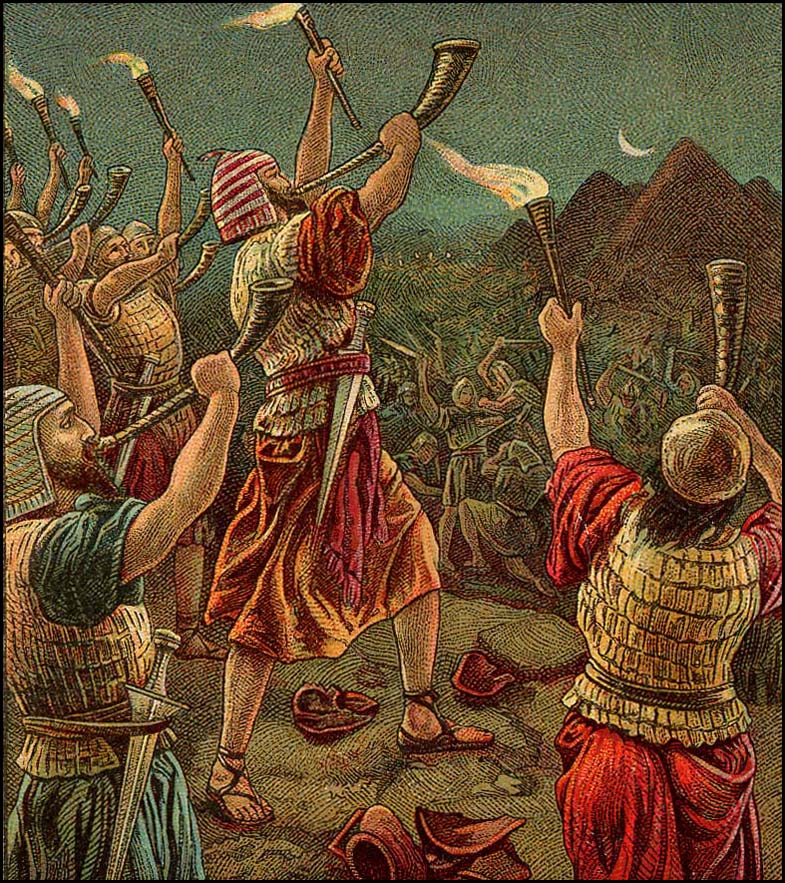This is the part of Gideon’s story that we tend to hear less about—isn’t it?
It’s no doubt that with Gideon God uses violence to free Israel from oppression, and that Gideon is one of the good guys—but we make both our reading mistakes at once if we conclude that, because Gideon was used by God, everything he did is blessed and he’s a model for us to follow. Far from it, I’m afraid.
As it turns out, Gideon ends up being one of the most disappointing Judges. He's certainly the most overrated.
I’m not saying Gideon gives us nothing to look up to. In Hebrews chapter 11 he is listed along with Moses and David and Daniel and Samson in the “Hall of Faith”—held up as an example of God using people to do great things not by their might but by their faith. The thing is—like Samson after him—Gideon’s on that list mostly despite himself! And that shows us something about the grace and the patience of God.
Time and time again in the book of Judges the people do as they see fit and God has to save them from themselves, and God does it through one of the least of them. Ehud is the unlikely lefty, Deborah the unlikely woman, and Gideon is unlikely because he just might have the weakest faith of them all.
I'm not suggesting we sit here and wag our fingers at Gideon. In fact, most of us can hardly blame him for testing God. Many of us have “laid out fleeces” for God and found God patient with us to reassure us with some kind of sign. The word of a trusted adviser or a sense of peace in prayer. A door opened at the right time or a series of reassurances that we’re walking in step with God. These are good graces of God and we’re thankful.
But let’s not kid ourselves. This isn’t exactly the Bible pumping Gideon’s tires, either. This is the Bible telling us: "See? Look at his faith. Tiny as a mustard seed. And that’s all God needs."
Just to make the message painfully clear, Judges takes us to the army camp of Midian, where we’re later informed there are 120,000 swordsman in Midian’s camp, and 32,000 men in Gideon’s. And this time it is the Lord testing Gideon, saying in verse 2—wait for it—"You have too many men for me to deliver Midian to you." A couple rounds of this and Gideon ends up with 300 soldiers to Midian's 120,000. That's 400 to 1.
(And by the way if you want to talk about the place of war in the Old Testament you’ve at least got to notice how many times it is God sending weakness up against strength).
We see the seeds for this back in the crime scene where we began. It isn’t a crime, in God’s eyes, that on this occasion Gideon struck down these oppressive enemy kings. The Lord had all but ordered it to be done. In the author's presentation the real crime is that after all that, here on the cusp of deliverance and a fresh start in faith, Gideon tries to bargain and puff chests with Zebah and Zalmunnah. He only kills them when they taunt him to be a man. Just look at the words these bully-kings use:
"As is the man so is his strength," they say.
Is that a Christian proverb or a threat to Christianity?
Curiously it echoes some of Moses’ last words to Israel, as they sat on the edge of the Promised Land to receive the blessing of his final song. In Deuteronomy 33:25 Moses said: “as are your days, so is your strength.” Not as is the man, but as are your days. What does that mean?
Remember that it was with Moses and the manna that the people had learned to rely on the Lord for what they needed each day, nothing less and nothing more. Remember, too, that Deborah’s song echoes this line: praying for strength that would rise afresh each day like the sun....
In the early aftermath of his obedience of faith we see Gideon falling for an awful parody of Moses' words, taunted to bravado rather than faith; to human powers rather than God's.
So Gideon’s legacy is a divided one. Power and honour and bravado are Gideon’s Delilah. What does it tell us if we give Samson a hard time and are quick to give Gideon a pass? In one sense Gideon is one of the greatest Judges of all since his name—Gideon, Mighty Warrior—would always recall the time God’s army beat 400 to 1 odds, thus redefining what we mean by Mighty.

But Gideon is known by another name as well—Jerub-Baal—which refers to his contention with other gods. It’s a nickname that sticks, I think, because at the end of the day his success has more to do with what he was against than what he was for.
Gideon's story concludes with the implication that oh, they had their forty years of peace—but the land enjoyed it more than the people did. For the people—if I may paraphrase MLK—it is peace in the sense more of the absence of conflict than the presence of the reign of God.
It is pretty common for us Christians to be known more for what we’re against and less for this different kind of life that we’re living for. It is all the rage as Christians to say the sinners prayer and get saved, and live the rest of our lives on our own, as the self-made men and women that our culture asks us and dares us and demands that we be. But if Gideon’s epilogue reveals to us anything it is that, left to ourselves, we might coast along for decades on a half-peace rather than lean into the daily grace of life in a God-guided Christian community.


No comments:
Post a Comment